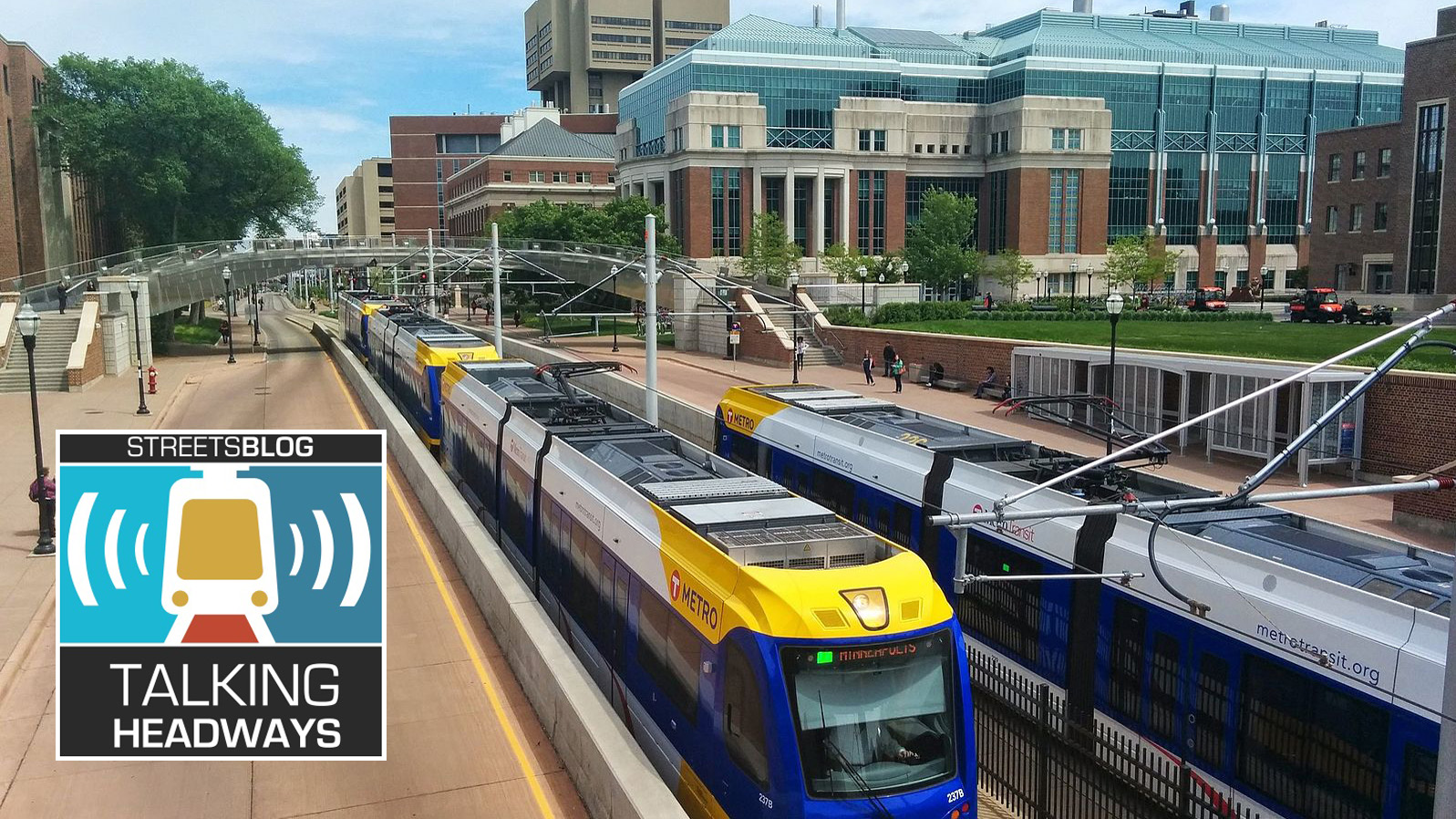This week we’re joined by Move Minnesota director Sam Rockwell to talk about climate bills Minnesota legislators have passed that could reduce highway and road building emissions in the state. We chat about setting transportation related climate targets, highway modeling and taking the time to read federal rule comment letters.
We recorded this interview before Minnesota Gov. Tim Walz joined the Democratic ticket as Kamala Harris's pick for vice president. For Rockwell's take on Walz's record, check out Streetsblog's coverage here.
Scroll down below the audio player for a partial edited transcript of our conversation, or click here for an unedited AI-generated readout of the entire episode.
Jeff Wood: So then that led to the 2023 law. What does that law say?
Sam Rockwell: That law says that anytime Minnesota DOT is going to do a capacity expansion project, so, you know, a road expansion project on a major highway, they have to measure whether that capacity expansion project over the course of 20 years will be consistent with the state's greenhouse gas and vehicle miles traveled targets. In other words, they have to take into account the induced demand impacts of that project and say, is this consistent? Are the projected emissions on this roadway consistent with the climate targets?
And are the projected driving impacts on this highway consistent with the VMT reduction targets? If they are not, which almost by definition they are not, then the agency has three options, right? One, cancel the project, two, adjust the project enough so that it is consistent, right? So take, you know, a set of bi-directional lanes and make those transit lanes, you know, add biking, walking facilities on the sides if it's a rural highway, something like that. Or they can create a portfolio of projects that does achieve those targets. So, they can fund more projects, the other projects have to be fully funded so that all of the projects together, the highway project and the other projects, all meet the goal.
So those other projects could be transit projects, biking projects, walking projects. You can also have land use initiatives like re-zonings as part of this. And so that's really what the law does. There's a preference for where those mitigation projects, those offset projects, should be, so if they can be in the community where the highway project is happening, then great. If that's infeasible, they have to be in a historically disadvantaged community. If that's infeasible, then go all the way up to statewide.
Jeff Wood: Was there a working group involved in this as well that came off of the law?
Sam Rockwell: Yeah, so the difference in our law, and there are a number of differences, but the big difference in our law and the Colorado laws is that we baked this vehicle miles traveled component into it. So you've gotta be hitting a vehicle miles travel reduction target. That was in part because the folks in Colorado said, you know, we're worried about loopholes in our law — of folks saying, well, you know, we're gonna be a hundred percent electric fleet by 2035, so you know, the emissions impacts are gonna be low. So we said, okay, we gotta make sure we've got the VMT reduction targets in there. Because of that, we really had a law that doesn't exist anywhere else. The legislature created a working group to figure out how to implement a law — spend you know, six, eight months talking through the dynamics of the law, thinking about how it can be implemented.
Then, if there are changes that need to happen to the law, come back with a report and recommendations to the legislature. Do you need funding? Do you need adjustments to the law? That group met every two weeks starting last June through February. It was a pretty exhaustive process. It was hosted by Minnesota DOT and comprised of folks who supported the law and folks who testified against it. The representatives from the City Engineers Association, County Engineers Association, the Metropolitan Planning Organization Group from the Greater Minnesota outside of the Twin Cities, someone from the Twin Cities MPO, which is called the Metropolitan Council, and so forth.
Jeff Wood: What were some of the opponents saying about this?
Sam Rockwell: A number of things. I mean, in the legislative session there was a lot of concern about projects that were perceived to be needed for safety purposes. So you've got a dangerous intersection here and let's make it an interchange, right? You've got some bottleneck, let's add a lane to relieve that bottleneck. I think the transportation department was not — MNDOT was not concerned about this surprisingly, but they said, you know, we have a big toolkit of things that we can do. We can reduce speeds, we can think about ways of diverting traffic when you come to an intersection — there's a toolkit beyond expansion.
Another thing was that the transportation engineering community made, I think, a very good point that a lot of what they do is responsive to land use developments. There's developments happening and then congestion clogs the roads and their job is to deal with that congestion by expanding the roads. I think that what's not really acknowledged there is, well, by widening the roads, you enable more development to happen. I think that that's a fair point. We actually had part of the law passed in 2023 address some of those land-use impacts. It said that you've gotta have VMT and climate impacts taken into account when doing land-use planning in the Twin Cities metropolitan area.






